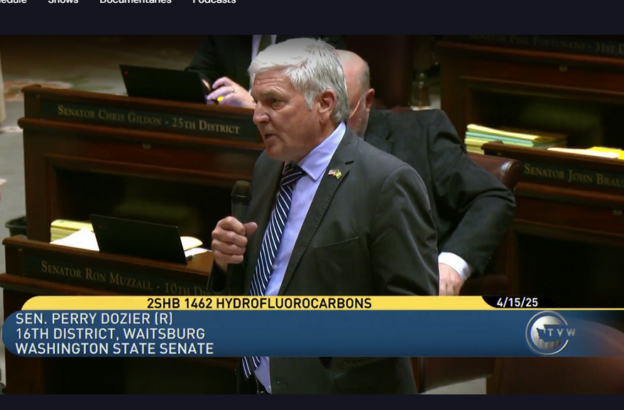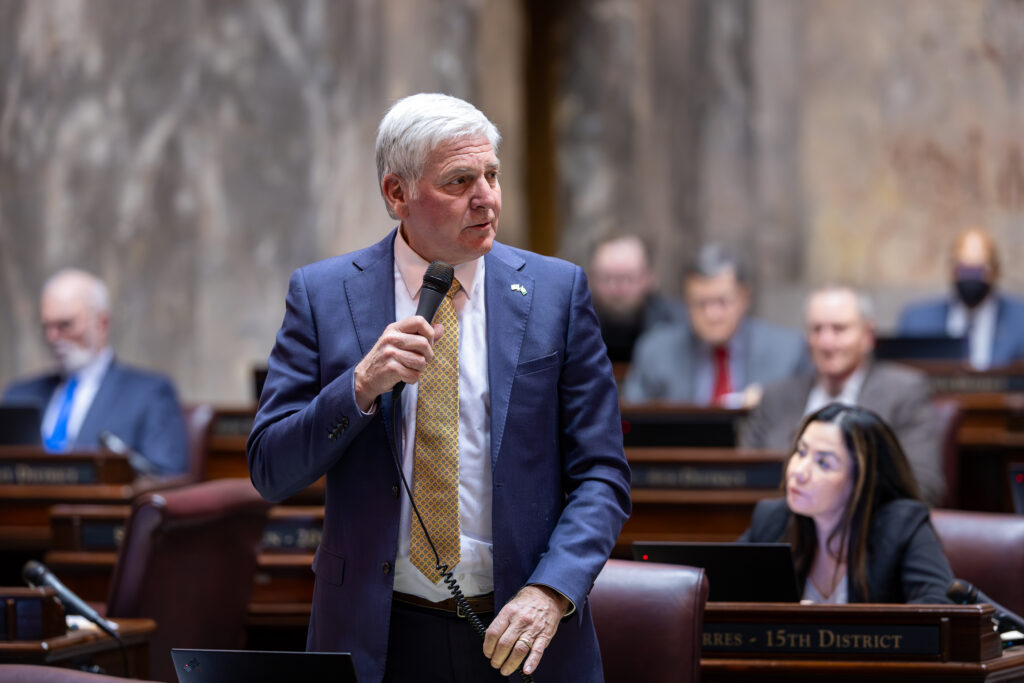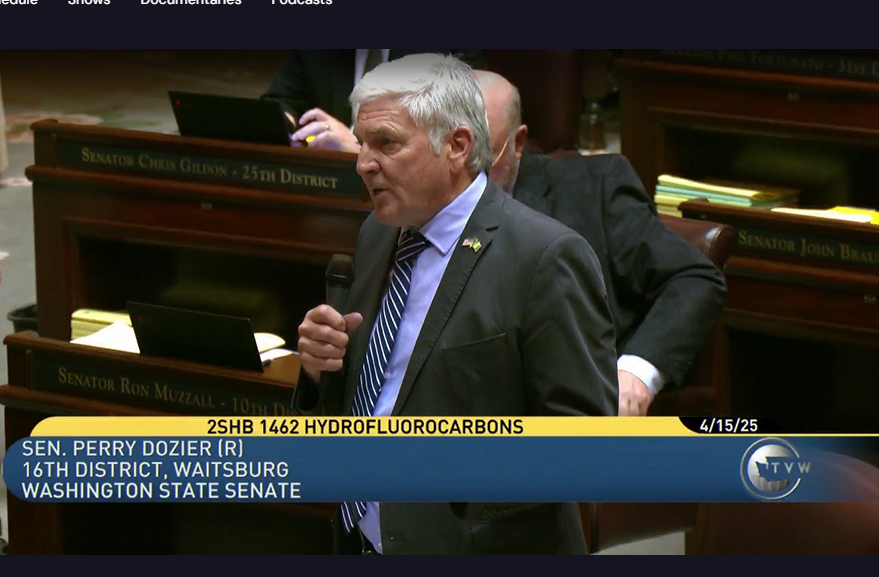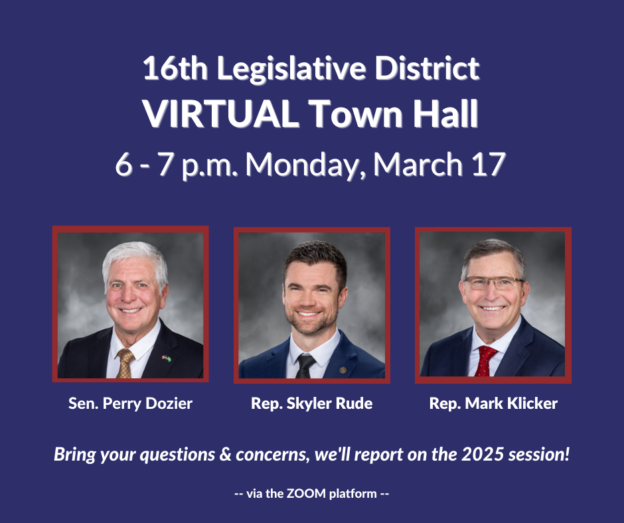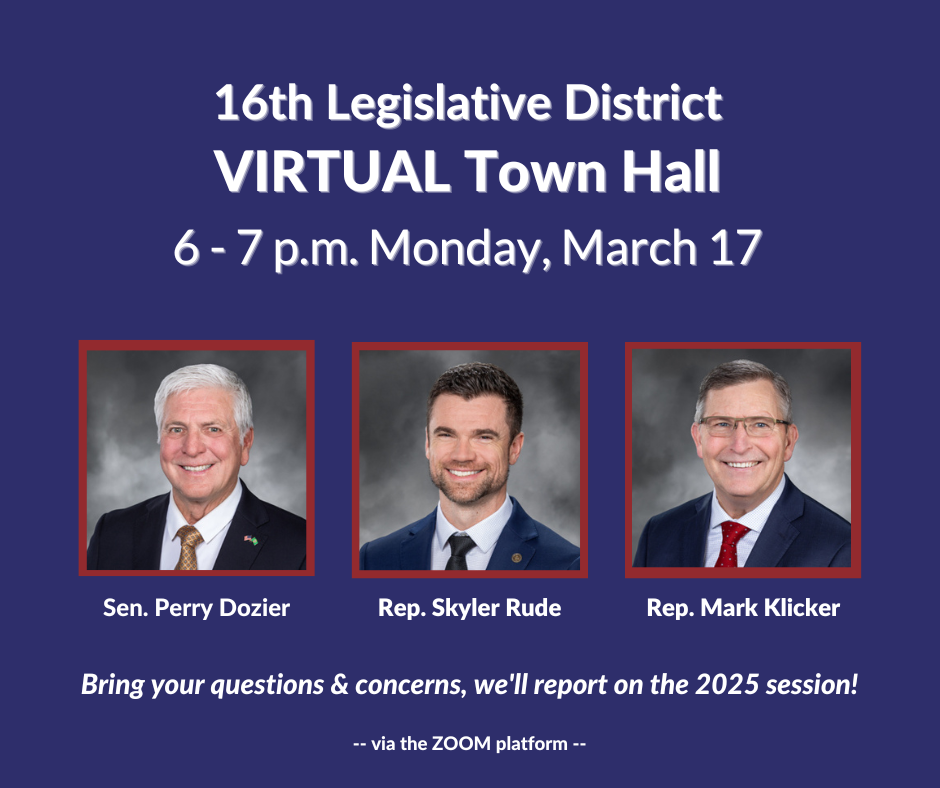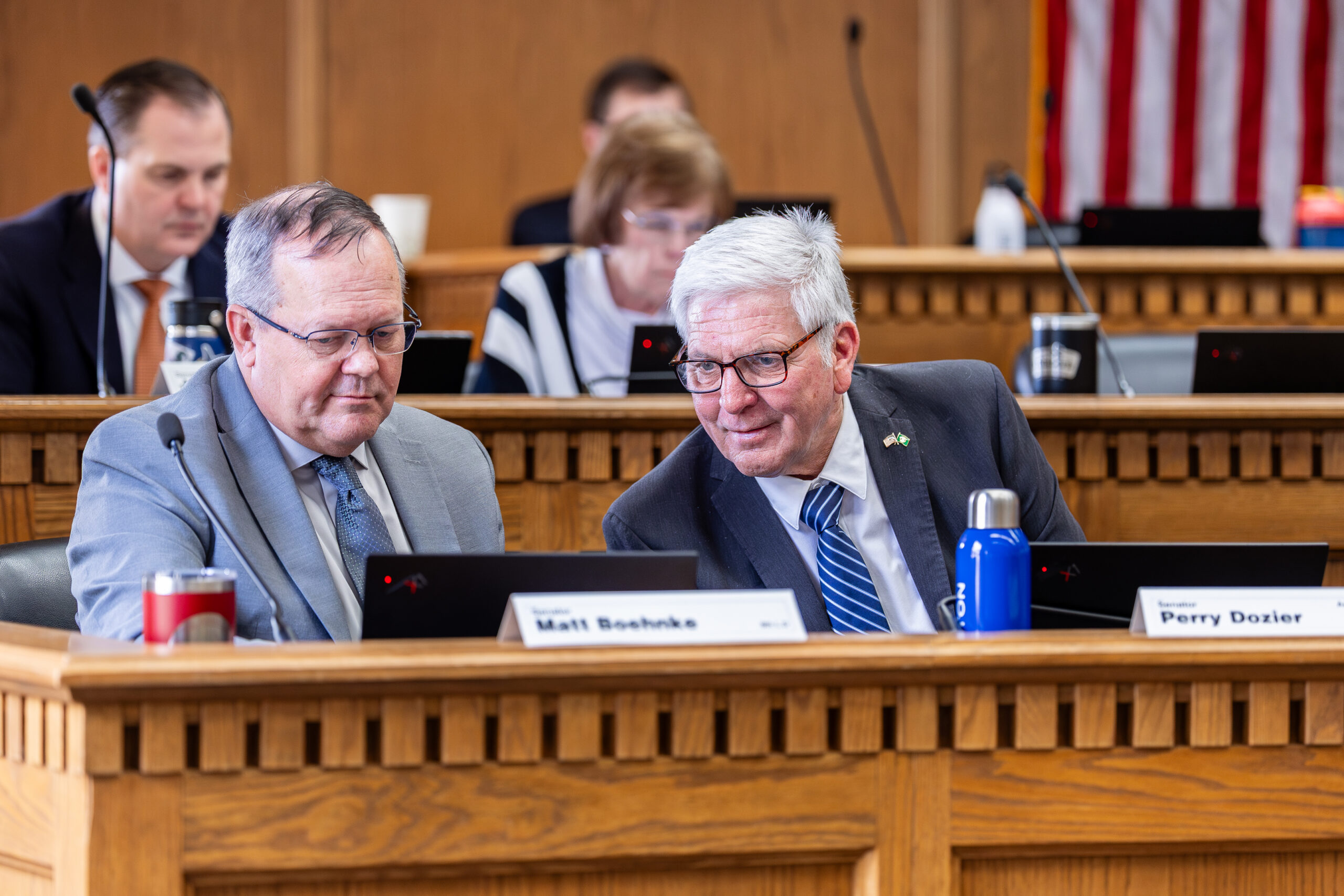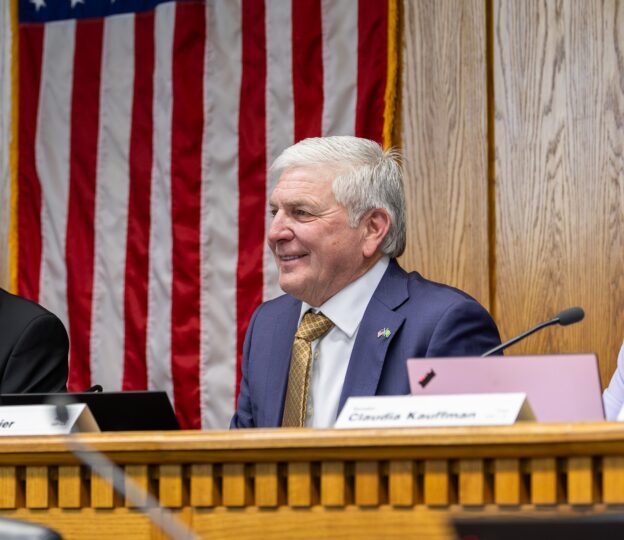Dear Neighbor,
This year’s regular legislative session will end no later than midnight this coming Sunday. Our state constitution says so, because the regular sessions in odd-numbered years are limited to 105 days — and Sunday is day 105.
If the Legislature still has work to do, it can go into what’s officially called an extraordinary session. We tend to call it a “special” session or simply, overtime.
A special session is looking like a pretty strong possibility this year, because the majority Democrats and the governor agree on raising taxes but not on which taxes to increase, and by how much. That’s up in the air even more because of what majority Democrats did on the day before Easter, when we were in session nearly eight hours.
Here are more details, taken from the news release I issued Saturday evening (here’s the relevant part of it):
Dozier opposes first wave of Democrat tax hikes
OLYMPIA, April 19… Today Sen. Perry Dozier and his fellow Republican senators opposed the first round of major tax increases brought to the full Senate: a sales-tax increase that will hit lower- and middle-income families harder, a tax increase that will drive capital out of Washington, and a collection of unrelated tax increases that includes a new tax on self-storage rentals.
Dozier, R-Waitsburg, offered this statement after the Senate’s majority Democrats pushed the three tax bills through during their third consecutive Saturday voting session of 2025:
“It’s a farce for the Democrats to keep talking about making the wealthy pay more when they clearly are willing to tax everyday Washingtonians. Today alone the Senate majority supported tax increases that will apply to childcare, nursing homes, synthetic tobacco products, self-storage companies, doorbell cameras, and much, much more.
“The tax bills that came out of the Senate today would cost more than $10 billion all by themselves, and we’re still expecting other taxes to be coming our way from the House. I heard Governor Ferguson on Thursday when he said $12 billion in new taxes is unsustainable, so the majority is close to that already – but maybe the Democrats just don’t care what he thinks.
“The best answer to the governor’s concerns about tax increases, and being ready for anything coming out of Washington, D.C., is the $ave Washington budget proposed by Senate Republicans. It doesn’t require a single tax increase and won’t cut anyone off of services. We made a motion to bring our budget bill to the floor today, but the Democrats said no.”
The governor hasn’t come out and said he will call legislators into a special session if there are too many new taxes in the budget they ultimately adopt — “they” being Democrat legislators, who are the only ones pushing new taxes.
Also, when Governor Ferguson said $12 billion in new taxes is “too risky” (in addition to “unsustainable”), he may have been referring to state-level taxes, not a combination of state and local. But if more services become taxable, the local sales taxes also apply, and the property-tax hikes being proposed certainly would mean local increases. That’s why I say the tax bills approved by the Senate on Saturday have put the count at $10-plus billion, with more tax increases in the pipeline.
Maybe the governor and the legislative Democrats will come to terms on taxes before midnight on day 105. I suspect they realize how it will appear to the public if we are pushed into a special session simply because of Democrat infighting about raising taxes.
Either way, multibillion-dollar tax increases seem inevitable this session, even though Senate Republicans have proposed a budget that does everything our state needs, using the revenue available and without a single cut to human services. It’s as though the majority is pursuing tax increases simply because it doesn’t think the people will push back — and that’s a poor way to govern.
Is the threat of a property-tax increase over? Not so fast
As of this past week the Democrats had not one but three bills to raise your property taxes. Each would affect the Washington law prohibiting the state and local governments from increasing your property-tax rate by more than 1% annually unless they get permission through a public vote.
Senate Bill 5798 would eliminate the 1% cap and tie tax-rate growth to inflation plus population growth; House Bill 2049 and Senate Bill 5812, introduced with identical wording, would triple the 1% limit. Each has received tremendous public opposition.
On Saturday there was new concern that Democrats would make SB 5798 / HB 2049 even worse, through a rewrite that would allow school districts to pursue higher levy amounts. This would take Washington’s K-12 funding system backwards, to the days when property-rich school districts had a huge money-raising advantage over property-poor districts.
Now the concern has shifted yet again. The House majority approved HB 2049 late last night, after taking out the part about the growth of property-tax rates — and as we anticipated, inserting a new part about larger school tax levies.
If this means the Democrats have completely abandoned their efforts to lift or eliminate the 1% cap on tax-rate growth, great. That is a victory by itself, for Republicans and especially the people who have applied so much pressure by stating their opposition to the bill.
However, enabling school districts to go for larger tax levies is still opening the door to higher property taxes, and sets the stage for two things to happen.
One is a return to the time when school districts were either “haves” or “have-nots” depending on property values. Republicans worked hard to level the playing field between districts, so property-rich districts didn’t have such an advantage. We don’t believe a child’s educational opportunities should depend on a ZIP code, and it’s shocking that Democrats would try to undermine that.
The other is that districts could once again become more reliant on local-levy dollars than on state-level funding, which sets the stage for another lawsuit like the one that brought about the landmark McCleary lawsuit more than a dozen years ago.
So don’t be fooled — in a way, HB 2049 is almost worse now, because of how it could raise the cost of living for homeowners and renters while also putting rural families and rural students at a disadvantage. We will fight this!
Another attack on agriculture
It isn’t just the tax increases being discussed in Olympia that worry me. The effort to impose rent control is likely to shrink the supply of rental housing, meaning higher prices, and the attempt to make striking workers eligible for unemployment benefits will increase the cost of doing business.
Neither of these is a tax increase, literally, but if they become law, each will make living and working in our state less affordable.
Another example which hasn’t gotten much attention is the bill to begin phasing out certain refrigerants in our state — and by going after refrigerants, House Bill 1462 also goes after food storage.
This bill came before the full Senate this past week, having been passed in the House already on a party-line vote. I used it as an example of how policies popular with certain interest groups can have a much darker side, and what this bill in particular means for growers across our state who rely on cold storage.
Click here or on the image above to view my remarks on HB 1462. Because it has been passed by both chambers but in different forms, I can’t tell you how it will end up exactly — but we already know it will be unfriendly to agriculture.
Regulatory changes add to the cost of doing business in our state, and while many of those costs end up being passed along to consumers, not every business sector can do so — agriculture being a prime example, because those of us who grow commodities are “price takers,” not “price makers.”
As I said on the floor of the Senate chamber, this bill is another of the many attacks I’ve seen on agriculture during what is now my fifth year as a senator. We should be protecting agriculture instead, knowing all the jobs it provides and the important role it has in our state economy. Let’s not kill the family farm!
***
I am working to make living in our state more affordable, make our communities safer, uphold our paramount duty to provide for schools, and hold state government accountable. I’ll work with anyone who shares those goals and wants to find solutions.
Please reach out to my office with your thoughts, ideas and concerns on matters of importance to you. I am here to serve and look forward to hearing from you.
Sincerely,

Perry Dozier
State Senator
16th Legislative District
EMAIL: Perry.Dozier@leg.wa.gov
OLYMPIA PHONE: (360) 786-7630
OLYMPIA OFFICE: 342 Irving R. Newhouse Building
MAILING ADDRESS: P.O. Box 40416, Olympia, WA 98504











